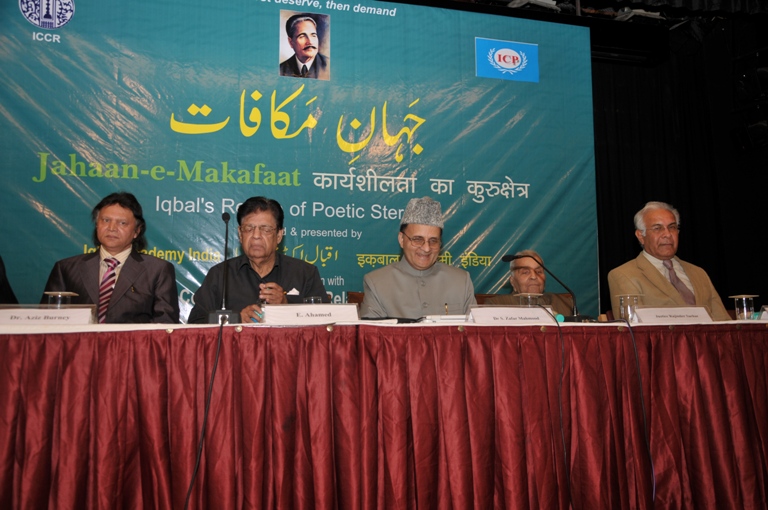Justice Rajender Sachar, Minister E.
Ahamed and Editor Aziz Burney laud
Allama Iqbal's message
 (In
the photo - L to R): Dr Aziz Burney,
Group Editor, Rashtriya Sahar
Newspapers, Mr E. Ahamed, Union Minister
of State for External Affairs * HRD, Dr
Syed Zafar Mahmood, Chairman, Iqbal
Academy India, Justice Rajender Sacha,
former Chief Justice and Mr Wajahat
Habibullah, Chairman, National
Commission for Minorities
(In
the photo - L to R): Dr Aziz Burney,
Group Editor, Rashtriya Sahar
Newspapers, Mr E. Ahamed, Union Minister
of State for External Affairs * HRD, Dr
Syed Zafar Mahmood, Chairman, Iqbal
Academy India, Justice Rajender Sacha,
former Chief Justice and Mr Wajahat
Habibullah, Chairman, National
Commission for Minorities
Jahaan-e-Makafaat, coffee-table printed
album published by Iqbal Academy India (www.iqbalindia.org)
was released at an impressive function
held on 16 November 2011 in BS Abdur
Rahman auditorium of India Islamic
Cultural Centre. The event was jointly
organized by Iqbal Academy India and
Interfaith Coalition for Peace
co-sponsored by Indian Council for
Cultural Relations, Government of India.
The album was released by Mr E. Ahamed,
Union Minister of State for External
Affairs & HRD. He praised the efforts of
the organizers to carry to the masses
particularly the youth Allama Iqbal’s
message of high human moral standards,
piety of soul, philanthropy and
selflessness activism. Justice Rajender
Sachar identified himself with Iqbal’s
philosophical views regarding high moral
conduct and said that the new album
should be made available to the students
for taking inspiration. The function was
also attended by Mr Wajahat Habibullah,
Chairman, National Commission for
Minorities and Mr Safdar Husan Khan,
Chairman, Delhi State Minorities
Commission besides a large audience with
the auditorium packed to the capacity.
Children of God’s Grace School and
Central School sang Iqbal’s poetic
supplication Lab pe aati hai dua ban ke
tamanna meri and the national song Saare
jahaan se achha Hindostaan hamara.
In the same function Dr Aziz Burney,
Group Editor, Rashtriya Sahara
Newspapers released the collection of
selected speeches, writings and project
details of Dr Syed Zafar Mahmood titled
as Paikaar-e-Zindagi. He is the Chairman
of Iqbal Academy India and President of
Interfaith Coalition for Peace, New
Delhi. Dr Burney said that the people
must read this book if they wish to have
useful and detailed tips for community
uplift of different kinds.
Jahaan-e-Makafaat
Coffee-table printed album published by
Iqbal Academy India, New Delhi
www.iqbalindia.org
The album consists of eighteen selected
couplets of Dr Sir Mohammad Iqbal
(1877-1932), Poet Philosopher of India
and Composer of the National Song: Saare
jahaan se achha Hindostaan hamara.
These couplets are printed in Urdu and
also transliterated & translated in
Hindi and English. For each couplet two
pages, facing each other, have been
devoted. In the background, each couplet
has been illustrated and depicted with a
full page photo with appropriate
relevance to the specific theme of the
couplet.
All the couplets give the message that a
good human being should devote his / her
substantial time everyday for working
selflesslessly so that the life of
others becomes better, more comfortable
and pleasing.
The album is an institutionalized effort
to uplift the general moral standard of
the current and upcoming generations and
make the individual more conscious of
his / her obligations toward societal
amelioration.
Paikaar-e-Zindagi
Paikaar-e-Zindagi is a collection of
selected articles and speeches authored
and delivered by Dr. Syed Zafar Mahmood
on different occasions during the last
few years coupled with a description of
the projects initiated by him for social
uplift. He has had a three-decade long
experience of public service and social
life as a senior government bureaucrat
in different states of India and abroad.
He had the pleasure of working in
multiple important positions in
different departments. This later
enabled him to make befitting
observations and criticism as evident
from this book. Specifically his concern
regarding the current pathetic condition
of the Muslim community in India, and in
the world, incite him to think and find
out practical solutions. He presents
these to the community and the society
with a motivating call for action duly
illustrated by how he himself has made
several institutional arrangements
successfully putting these into
practice.
The book has been compartmentalised in
four sections. One is
“Raftaar-e-Zindagi” – that means the
vibrancy and velocity of life; it gives
his short biography. The second section
documents his selected articles with the
generic name of “Afkaar-e-Zindagi” –
namely, life's thought process. The
third one is a compilation of his
speeches titled as “Guftaar-e-Zindagi” –
that is, some selected talks delivered
by him at various forums. And, the last
section gives a glimpse through the
projects launched by him labeled as “Ashjaar-e-Zindagi”.
We can literally translate this as the
trees that have been planted.
Thus, Raftaar-e-Zindagi,
Afkaar-e-Zindagi, Guftaar-e-Zindagi and
Ashjaar-e-Zindagi together make Dr Zafar
Mahmood's life, so far, as
“Paikaar-e-Zindagi” – It means
perseverance launched in life. This
title is taken from Allama Iqbal's
couplet:
Gharaz hai paikaar-e-zindagi se kamaal
paaye hilaal tera
Jahaan ka farz-e-qadeem hai tuu,adaa
misaal-e-namaaz ho ja
(Meaning thereby) .....
O human being, through perseverance, you
can prove your mettle
You are the ancient obligation of His
creation. Offer yourself to the Lord.


